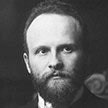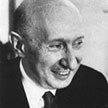Nobel laureates who contributed to otolaryngology
Nobel laureates Emil Theodor Kocher, Róbert Bárány, and Georg von Békésy contributed major advances to the field of otolaryngology. Through retrospective research, we explored their lives and present their discoveries.
By P. Ryan Camilon, BA; Shaun A. Nguyen, MD; Eric J Lentsch, MD; Ted A. Meyer, MD; and Paul R. Lambert, MD
 Emil Theodor Kocher
Emil Theodor KocherNobel laureates Emil Theodor Kocher, Róbert Bárány, and Georg von Békésy contributed major advances to the field of otolaryngology. Through retrospective research, we explored their lives and present their discoveries.
 Róbert Bárány
Róbert BárányAs professor of surgery at the University of Bern, Kocher’s research focused on the thyroid gland, becoming the first to excise the thyroid for goiter in 1876. In 1909, Kocher received the Nobel Prize for his discoveries in the pathology, physiology, and surgery of the thyroid gland. In addition, his techniques, including the implementation of antiseptic wound treatment, significantly decreased thyroid-related operative mortality.
Bárány was an Austro-Hungarian otologist who explored the functions of the vestibular apparatus, which led to multiple discoveries including, most notably, the caloric reaction. Further work addressed vestibular reaction movements associated with equilibrium and the physiology of nystagmus. In 1914, he was awarded the Nobel Prize while a prisoner of war in Russia.
 Georg von Békésy
Georg von BékésyBekesy, a Hungarian biophysicist, is credited with laying the foundation for cochlear mechanics. He sought to develop mechanical models that could reproduce the functions of the cochlea. In 1961, Bekesy was awarded the Nobel Prize in recognition of his research on the inner ear including his critical discovery of the cochlear traveling wave.
Though Barany was the only Nobel laureate to arise from within the field of otolaryngology, each recipient must be noted since their developments have greatly influenced our field. As not only discoveries in otology, but also those in general surgery and biophysics have had implications on otolaryngology, we are reminded of the truly, intellectually vast nature of this specialty.













